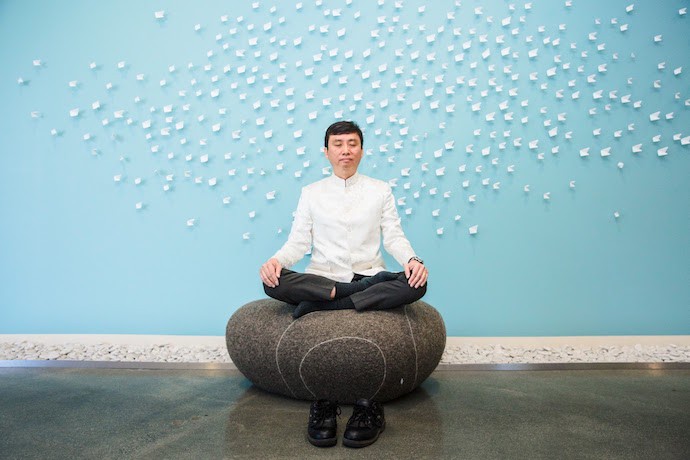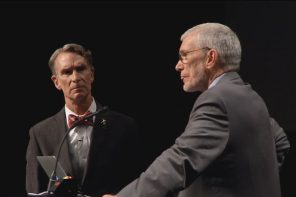If the words “corporate” and “mindfulness” no longer sound strange together, it’s partly because of the career of Chade-Meng Tan.
A software engineer from Singapore, Tan joined Google in 2000 as employee number 107. He later founded the company’s in-house meditation program and became one of corporate mindfulness’ most visible advocates.
Though Tan left Google six months ago, his final official job title at the company still doubles as his nickname: Jolly Good Fellow. Over the course of two phone conversations, RD asked Tan—who was, in fact, quite jolly—if mindfulness is a watering-down of Buddhism, whether meditation can truly save the world, and why he specializes in teaching rich people.
You’re one of the only prominent advocates of secular mindfulness who is not white. What’s that like?
Not only am I one of the only non-white people, but I’m one of the very few people who self-identify as Buddhist. Tim Ryan, for example, and Jon Kabat-Zinn—they don’t identify as Buddhist.
If you’re white, you see Buddhism with a different perspective from how we see it in Asia. When a white guy sees Buddhism, he thinks it’s cool. He thinks of Buddhists as peaceful people going “Ommmmm.”
Growing up, I had a very different experience of Buddhism. I thought it was extremely uncool—you go to a temple and you make an offering.
How did your opinion of Buddhism change when you came to the United States?
When I started learning Vipassana, everything changed. I became a real Buddhist. The dharma you see in America is pure, as opposed to Asian Buddhism in which you go to a temple and there’s nothing else. I have credibility in saying that because I’ve seen both sides. Not that American Buddhism is free of problems, but it’s the purest Buddhism. Of course, if you go to a real Zen master in Japan, that’s even purer. It is absolutely essential to remember the source of the teachings.
You’re saying that modern mindfulness has lost contact with the source teachings?
Absolutely. No doubt about it.
Didn’t you help to bring that about?
I hope not. The part that doesn’t concern me about the watering down of mindfulness is the intention of the practitioner. You go to Google and more than half the class is practicing mindfulness in order to become more successful.
Is that a problem? I would say it’s not.
I think the practice is so powerful that regardless of original intention, if you do the practice right you get the same outcome, the good outcome.
In that corporate setting, the objective of mindfulness programs aligns with the students’ intentions—in other words, greater productivity at work. Without aspects of the practice that challenge that intention, can’t it just get reinforced?
It could be true, which is why I am very careful about it. When I was at Google, I hadn’t hosted any speakers that said, “I am doing meditation to create the conditions for world peace and to help me become more successful.” So I said both.
I think you’re right. I think in this industry it’s really important for the people doing this, especially teaching this, to have the intention of doing both: helping the business be successful and doing good for the world. If you only have one, then you lose something.
The mindfulness course is not about making worker bees who are more compliant. The courses are producing better human beings who also happen to be more productive.
Is there a danger in putting the onus on the employee to relieve all her stress through self-development?
The answer is compassion. I’m hoping that if you could always include kindness and compassion in the mindfulness curriculum, people will become even more aware of their own suffering and the suffering of those around them. If nobody complains about stress, they don’t do anything. What if everybody is aware, “Oh my gosh, we have all this stress?”—an awareness that comes from mindfulness. Then, if everybody talks about the stress, maybe there’s some change.
You have said that it is your life’s mission to create the conditions for world peace. How?
My plan has two pillars. The first is you have to eliminate poverty and environmental destruction. Is that enough? I think we can tell for certain the answer is “no.” Look at the rich countries of Europe; look at America. They are free from material suffering, yet still they are suffering. Still, they don’t have peace. So what is needed on top of that is inner peace, inner joy, and compassion.
Look at the problem from the reverse point of view: if we create inner peace, inner joy, and compassion, does that create world peace? No, because there are still people who are hungry; there are still people in poverty. Therefore, you need to eliminate poverty and environmental destruction as well.
Whichever one you start with, you find that you need the other one. It has never been tested in the history of the world. But my opinion is, if we achieve both then we’ll have the conditions for world peace.
For example, if we increase inner peace, inner joy, and compassion, then the poverty problem will get solved a little bit more. Because if rich people are more aware of suffering, then they’ll be more willing to give. Then other people suffer less, and they are more able to develop inner peace, inner joy, and compassion. It becomes a cycle.
You say the rich will be more likely to give. In a world where the 85 richest people own half the planet’s wealth, shouldn’t they be forced to give through taxation and redistribution?
There are a couple of mechanisms happening at once. One is the propensity of wealth to compound; so if somebody has capital and somebody else doesn’t have capital, the guy who has capital is eventually going to have more of it. If he can pass money on to his family, one family will become much richer than the other. This is the nature of capitalism, unfortunately.
The mechanism on the other extreme is the propensity for people, when lacking incentive, to avoid doing anything at all. Incentivization is important. The extreme example is collectivization in communist countries. If you collectivize farms, everybody starves because nobody works hard enough to produce sufficient food.
And then you move closer to capitalism like that seen in the United States. You still have problems. You don’t have enough money for infrastructure. If you did have enough money for infrastructure, you wouldn’t have enough for poverty alleviation or for libraries, and so on. But maybe what we have in America is just about right: a system near the middle, trending towards the capitalist end. Then we can rely on inner development to create more equity in society.
But even in the United States there’s a poverty rate of 15%. Is that tolerable?
Fifteen percent sucks. Fifteen percent is too high. One partial solution that I’ve heard is a universal income. The other idea, in place in Singapore, is that government takes care of the most basic things—defined as infrastructure, security, law and order, education, and housing. There will still be poor people but what is important is that everyone has the same opportunity. Right now in America we don’t have that because colleges are too expensive and student debt is too high. Some communities don’t even have water.
Does it concern you that schools or employers might offer meditation in lieu of desperately needed material resources?
I am not concerned, but it’s for a bad reason. The reason I’m not concerned is that those communities that are deprived don’t get mindfulness in lieu of more resources. They don’t get more resources, period—whether they have mindfulness or not. It sucks, but it’s a fact.
Politicians aren’t saying, “Hey, we’re doing this to save money. You get mindfulness but you don’t get a new gym.” They’re saying, “you don’t get a new gym, period.” And then the people who care, the “good” people, see that the school isn’t getting a new gym. Then what? They have to help them some other way.
I think your concern is a good concern, but it hasn’t happened in the real world. Deprivation is happening independent of what the mindfulness people are doing. Our intention is pure. We’re trying to help people despite the deprivation. I think that even though it hasn’t happened, it is good for us to be vigilant. If it ever happens in the future, we should point it out.
What’s the difference between your goal of spreading meditation and any other missionary effort?
First, there’s a difference between spirituality and religion. I think spirituality is universal. Anybody can practice spirituality, with or without religious belief. I don’t really care about Buddhism, but I care tremendously about dharma, which is defined as universal law.
I care especially about the aspects of universal law relating to suffering and liberation from suffering. They’re everywhere. I’m not trying to promote Buddhism but dharma. If I’m careful about doing this, it has the potential to unite religions. It has the potential to unite everybody else, too.
Let’s say I’m a Sunni Muslim living in Baghdad. Are you envisioning a situation in which I have access to a secular meditation center where I can practice meditation outside of my routine of daily prayer?
Yes, of course. Not just that, I hope it can enhance the practice of Islam. So by doing meditation, you become an even better Muslim.
It sounds like you’re you saying there’s something lacking in other religions…
I think every religion lacks something. Buddhism is very, very advanced in its meditation techniques. On the other hand, what do we lack? I say we lack two big things. The first is service. Our Christian friends are far advanced in serving the world. So, I’ve been learning from them.
The second is love. Christians talk about love all the time; in Buddhism, we hardly ever do. Some aspect of love is really agape. There’s no Buddhist concept like agape. It’s a problem because then Buddhists cannot explain the love that comes from compassion. So, I think it’s not a one way street; it’s a multi-way street. Everybody can learn from everybody else. If you’re careful to do that, then it’s not patronizing. Then it’s like sharing. Like, everyone brings a dish to the potluck.
You have said that you chose to focus on the corporate world because that way you can move the world’s most powerful people toward change.
Yes. At the same time, the fact I’m doing it actually reflects a limitation on my part. For example, I don’t know how to teach children. I’ve never taught prisoners; I’ve never taught the disadvantaged population. I don’t know how to do those things.
What I can do is teach the engineers and leaders at Google. If you look in from the outside, it looks like I chose the population for its impact, which, in a way, is true. But I did it, in a sense, because of my limitation. So that’s my dirty little secret. Now you know.
Those people are already doing well. Why do they need more help?
Because even they are suffering. Even more importantly, their suffering causes more suffering to the people around them precisely because they have wealth and power. By addressing that population, I can limit the damage it does to the world. If a poor guy suffers, he suffers and maybe his wife does, too. If a rich guy suffers, everyone around him suffers: his butler, his employees, his thousand people.
Fundamentally, I think it comes down to the compassion in recognizing that even the rich suffer. If a rich man is suffering, in a sense it’s more horrible because he looks at himself and says, “I shouldn’t be suffering.” So there is that meta-suffering.
As a Buddhist yourself, I’m sure you have this thought: “I shouldn’t be suffering. I’m not feeling happy, but I’m a fucking Buddhist.”
UPDATE:
Chade-Meng Tan offers a follow-up to this conversation here, elaborating on a few key points. And stay tuned to this channel for more from Max Zahn on the great debates in American Buddhism about mindfulness, money, and the meaning of life.
–The Eds.
Also on The Cubit: Zen and the Art of Zombie Killing
Follow The Cubit, RD‘s religion-and-science portal, @TheCubit





